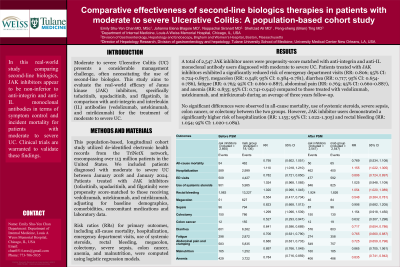Sunday Poster Session
Category: IBD
P0882 - Comparative Effectiveness of Second-Line Biologic Therapies in Patients With Moderate to Severe Ulcerative Colitis: A Population-Based Cohort Study
Sunday, October 27, 2024
3:30 PM - 7:00 PM ET
Location: Exhibit Hall E


Shu-Yen Emily Chan, MD, MSc
Weiss Memorial Hospital
Chicago, IL
Presenting Author(s)
Emily Shu-Yen Chan, MD, MSc, Natchaya Polpichai, MD, Shehzad Ali, MD, Olumuyiwa Idowu, MD
Weiss Memorial Hospital, Chicago, IL
Introduction: Moderate to severe Ulcerative Colitis (UC) presents a considerable management challenge, often necessitating the use of second-line biologics. This study aims to evaluate the real-world efficacy of Janus kinase (JAK) inhibitors, specifically tofacitinib, upadacitinib, and filgotinib, in comparison with anti-integrin and interleukin (IL) antibodies (vedolizumab, ustekinumab, and mirikizumab) for the treatment of moderate to severe UC.
Methods: This population-based, longitudinal cohort study utilized de-identified electronic health records from the TriNetX network, encompassing over 113 million patients in the United States. We included patients diagnosed with moderate to severe UC between January 2018 and January 2024. Patients treated with JAK inhibitors were propensity score-matched to those receiving vedolizumab, ustekinumab, and mirikizumab, adjusting for baseline demographics, comorbidities, concomitant medications, and laboratory data. Risk ratios (RRs) for primary outcomes, including all-cause mortality, hospitalization, ED visits, use of systemic steroids, rectal bleeding, megacolon, colectomy, severe sepsis, colon cancer, anemia, and malnutrition, were computed using logistic regression models.
Results: A total of 2,547 JAK inhibitor users were propensity-score matched with anti-integrin and anti-IL monoclonal antibody users diagnosed with moderate to severe UC. Patients treated with JAK inhibitors exhibited a significantly reduced risk of emergency department visits (RR: 0.806; 95% CI: 0.724-0.897), megacolon (RR: 0.548; 95% CI: 0.384-0.781), diarrhea (RR: 0.717; 95% CI: 0.654-0.786), fatigue (RR: 0.765; 95% CI: 0.660-0.887), abdominal pain (RR: 0.765; 95% CI: 0.660-0.887), and anemia (RR: 0.835; 95% CI: 0.741-0.942) compared to those treated with vedolizumab, ustekinumab, and mirikizumab during an average of three years follow-up. No significant differences were observed in all-cause mortality, use of systemic steroids, severe sepsis, colon cancer, or colectomy between the two groups. However, JAK inhibitor users demonstrated a significantly higher risk of hospitalization (RR: 1.155; 95% CI: 1.022-1.305) and rectal bleeding (RR: 1.054; 95% CI: 1.020-1.089).
Discussion: In this real-world study comparing second-line biologics, JAK inhibitors appear to be non-inferior to anti-integrin and anti-IL monoclonal antibodies in terms of symptom control and incident mortality for patients with moderate to severe UC. Clinical trials are warranted to validate these findings.
Note: The table for this abstract can be viewed in the ePoster Gallery section of the ACG 2024 ePoster Site or in The American Journal of Gastroenterology's abstract supplement issue, both of which will be available starting October 27, 2024.
Disclosures:
Emily Shu-Yen Chan, MD, MSc, Natchaya Polpichai, MD, Shehzad Ali, MD, Olumuyiwa Idowu, MD. P0882 - Comparative Effectiveness of Second-Line Biologic Therapies in Patients With Moderate to Severe Ulcerative Colitis: A Population-Based Cohort Study, ACG 2024 Annual Scientific Meeting Abstracts. Philadelphia, PA: American College of Gastroenterology.
Weiss Memorial Hospital, Chicago, IL
Introduction: Moderate to severe Ulcerative Colitis (UC) presents a considerable management challenge, often necessitating the use of second-line biologics. This study aims to evaluate the real-world efficacy of Janus kinase (JAK) inhibitors, specifically tofacitinib, upadacitinib, and filgotinib, in comparison with anti-integrin and interleukin (IL) antibodies (vedolizumab, ustekinumab, and mirikizumab) for the treatment of moderate to severe UC.
Methods: This population-based, longitudinal cohort study utilized de-identified electronic health records from the TriNetX network, encompassing over 113 million patients in the United States. We included patients diagnosed with moderate to severe UC between January 2018 and January 2024. Patients treated with JAK inhibitors were propensity score-matched to those receiving vedolizumab, ustekinumab, and mirikizumab, adjusting for baseline demographics, comorbidities, concomitant medications, and laboratory data. Risk ratios (RRs) for primary outcomes, including all-cause mortality, hospitalization, ED visits, use of systemic steroids, rectal bleeding, megacolon, colectomy, severe sepsis, colon cancer, anemia, and malnutrition, were computed using logistic regression models.
Results: A total of 2,547 JAK inhibitor users were propensity-score matched with anti-integrin and anti-IL monoclonal antibody users diagnosed with moderate to severe UC. Patients treated with JAK inhibitors exhibited a significantly reduced risk of emergency department visits (RR: 0.806; 95% CI: 0.724-0.897), megacolon (RR: 0.548; 95% CI: 0.384-0.781), diarrhea (RR: 0.717; 95% CI: 0.654-0.786), fatigue (RR: 0.765; 95% CI: 0.660-0.887), abdominal pain (RR: 0.765; 95% CI: 0.660-0.887), and anemia (RR: 0.835; 95% CI: 0.741-0.942) compared to those treated with vedolizumab, ustekinumab, and mirikizumab during an average of three years follow-up. No significant differences were observed in all-cause mortality, use of systemic steroids, severe sepsis, colon cancer, or colectomy between the two groups. However, JAK inhibitor users demonstrated a significantly higher risk of hospitalization (RR: 1.155; 95% CI: 1.022-1.305) and rectal bleeding (RR: 1.054; 95% CI: 1.020-1.089).
Discussion: In this real-world study comparing second-line biologics, JAK inhibitors appear to be non-inferior to anti-integrin and anti-IL monoclonal antibodies in terms of symptom control and incident mortality for patients with moderate to severe UC. Clinical trials are warranted to validate these findings.
Note: The table for this abstract can be viewed in the ePoster Gallery section of the ACG 2024 ePoster Site or in The American Journal of Gastroenterology's abstract supplement issue, both of which will be available starting October 27, 2024.
Disclosures:
Emily Shu-Yen Chan indicated no relevant financial relationships.
Natchaya Polpichai indicated no relevant financial relationships.
Shehzad Ali indicated no relevant financial relationships.
Olumuyiwa Idowu indicated no relevant financial relationships.
Emily Shu-Yen Chan, MD, MSc, Natchaya Polpichai, MD, Shehzad Ali, MD, Olumuyiwa Idowu, MD. P0882 - Comparative Effectiveness of Second-Line Biologic Therapies in Patients With Moderate to Severe Ulcerative Colitis: A Population-Based Cohort Study, ACG 2024 Annual Scientific Meeting Abstracts. Philadelphia, PA: American College of Gastroenterology.
